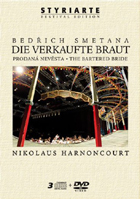

First performance of the German translation by E. Züngel at the Helmut-List-Halle in Graz, Austria July 2011.
Bedrich Smetana (1824-1884) is called the "father of Czech music" for a good reason. He was the first to draw freely from the
deep roots of Bohemian folk music, and elevate and springboard it unto the world stage. In his operas, as in his orchestral works, he strived to capture and portray
the spirit of his homeland, rather than write grand operas based on mythical legends. The comic opera The Bartered Bride has been,
and will remain, one of the gems of the opera stage. It is a cleverly written comedy of mistaken identities in which the story and music overflow with
the simple joys of life, so much so as to come complete with circus acts (the famous Dance of the Comedians) and an opening chorus to the second act
extolling the virtues of beer. It is about the triumph of love over money, of good over evil, always present in the common day to day life.
This Styriarte Festival production, under the quicksilver musical direction of conductor Nikolaus Harnoncourt,
is a joy to watch and listen to from start to finish. The jovial mood of the whole opera is immediately set by the pinpoint accuracy, fleetfooted and rapid
fire delivery of the overture. In particular, the string players of the Chamber Orchestra of Europe deserve a standing ovation for this
one. The two principal singers, Dorothea Röschmann as Marie, and Kurt Streit as Jenik, live their roles perfectly
and always remain in character, even when they are not singing. The rest of the cast are all in fine form, with Ruben Drole standing
out as a superb Kecal, the marriage-broker. The costumes are all simple and yet go a long way in befitting and strengthening each and every character
of the story. The stage direction by Philipp Harnoncourt always keeps things moving and naturally focuses your attention where
it should. The set itself, although minimal, plays a major role in establishing the time and place in which the drama unfolds, and because of its two-tiered
and uneven platform construction, allows for a clear view of everyone, even when the stage is overflowing with singers and dancers. It's built from pieces
of an original country fair ride from the 1920s called an Amore-Bahn, complete with multi-coloured lightbulbs and rickety wooden rails
and platforms, and in itself acts to reinforce the simple joys of life this opera promotes. Add to this a libretto in which the dénouement
of the plot is perfectly paced, and a score by Bedrich Smetana in which all the arias, duets, trios, quartets and even vocal sextet are a pleasure to hear,
and pull you deeper and deeper into the story, and that 3 hours feels more like 30 minutes. The final chorus comes full circle to bring down the curtain
with the same jubilant and festive music that opened the first act.
The presentation and packaging of this release are to be admired. The actual DVD case opens like a book containing 207 pages which include a full libretto with
translations, plenty of informative background information, and many stunning full page photographs of the production. The front and back covers of the book
hold the 3 audio CDs and the DVD which also includes highlights from the opera rehearsals. This is must-have material for opera fans, and even if you're not into
opera, this may very well be the one that converts you. Highly recommended!
For more info on the Styriarte Festival, visit the official website HERE
Jean-Yves Duperron - May 2012